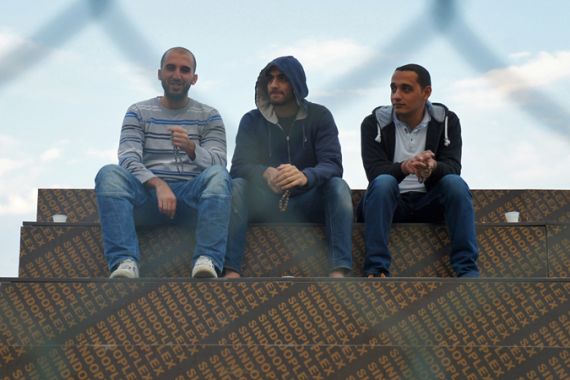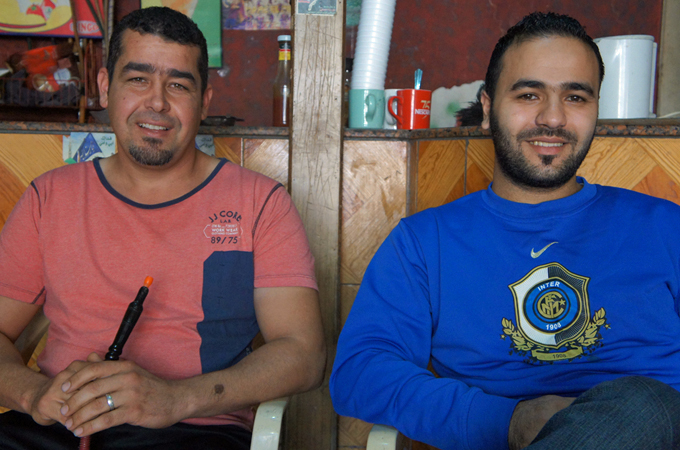Escaping the Syrian spillover
Palestinian refugees struggle to avoid sectarian violence surrounding camps in Tripoli, Lebanon.

Beddawi refugee camp, Lebanon – The ongoing investigation into the November 19 attack on the Iranian embassy in Beirut has so far uncovered the identities of two suicide bombers.
The revelation that one of the dead suspects, Adnan Mousa Mohammed, was Palestinian – from Sidon’s overcrowded and impoverished Ein el-Helweih refugee camp – is chilling for Lebanon’s vulnerable Palestinian community.
“The Palestinians always pay a price,” said Khalid Yamani, a worker with the Palestinian Youth Organisation from his office in the Beddawi refugee camp, located on the outskirts of Lebanon’s northern city of Tripoli. His words echo fears shared by many of the 455,000 Palestinians registered as living in Lebanon.
Beddawi has been swamped by Palestinians seeking refuge from conflict in recent years. In 2007, the neighbouring camp of Nahr el-Bared – then the site of a prosperous regional market selling black-market goods from Syria – was destroyed in a prolonged battle between the Lebanese army and a hard-line armed group, Fatah al-Islam.
Thousands of civilians fled the violence to Beddawi, having lost their homes, livelihoods and tight-knit community. As a result, the camp’s population doubled to 30,000.
More than six years later, promises by the Lebanese government to rebuild Nahr el-Bared into a “model” camp remain unfulfilled. Only 1,200 families have returned so far, reconstruction has been slow, and international donors have not honoured their pledges.
|
|
| Inside Story – Has Syria’s war spilled over to Lebanon? |
Thousands of its refugees remain stranded and impoverished in Beddawi, and voice anger at the United Nations Relief and Works Agency (UNRWA) for cutting aid in rent, health and food while they are still in crisis. UNRWA director Ann Dismorr explained that a combination of donor fatigue and the Syrian humanitarian crisis has eclipsed aid for Nahr el-Bared assistance, and that UNRWA has run out of funds.
“What we’ve done is target the most vulnerable,” Dismorr said. “So now we aim to give rent to 2,000 families instead of 3,000, and the food assistance would go to 6,300 individuals. Health would be harmonised to the same level of all other Palestinians.”
A joint UNRWA and American University of Beirut survey in 2010 found that more than 66 percent of the Palestinian population in Lebanon lived under the poverty line. Since then, a new wave of up to 80,000 Palestinian refugees from Syria have arrived, many to Beddawi, exacerbating already dire living conditions and flooding the dismal labour market.
Sectarian violence
The camp’s security is also at risk. Since the Syrian civil war began, sectarian violence has flared between Tripoli’s Alawite-dominated Jabal Mohsen and the Sunni-majority Bab al-Tabbaneh neighbourhoods. Rockets and gunfire are seen and heard by Beddawi‘s residents, who are caught in-between. Artillery occasionally lands inside the camp, which today is cordoned off by a heavy army presence.
 |
| Amer Serhan, 30, runs a cafe at the Beddawi refugee camp [Rebecca Murray/Al Jazeera] |
Amer Serhan, 30, is a cafe owner who spends most days hanging out at his establishment with friends drinking coffee, smoking shisha and playing video games. All the young men have finished high school or university, but cannot find work. Serhan said he opened the cafe because he “had to do something”.
“The violence is too bad here,” he said. “There is no work and we can’t go anywhere. We don’t go to downtown Tripoli because there are snipers, and we have trouble at checkpoints. Everyone has weapons. If we go there, we take a big risk.” But even at his cafe Serhan is not safe. While he was sitting outside the cafe one day, an errant bullet from the fighting grazed his chest.
Concerned about the threat of conflict spreading inside the camp, along with a steady stream of unfamiliar refugee arrivals, Serhan and his friends produced a film about Beddawi’s security. “We made it to show that we are unsafe. There were some people using guns and knives and killing each other inside the camp… Here, everyone knows each other.”
What Palestinians have learnt is the lesson of Nahr el-Bared ... that they could be a scapegoat for any party.
‘A dangerous mix’
The UNRWA has registered 455,000 Palestinians in Lebanon. The population does not have Lebanese citizenship or papers, and is subject to discriminatory laws forbidding them to own property, build inside the camps, or work in more than 70 skilled professions. Although the labour laws were recently amended, little has changed on the ground.
“Tripoli has fanatic groups growing, and the camp is impoverished. This is a dangerous mix,” warned Wafa el-Yassir, the head of Norwegian People’s Aid, a charity that works in the camps.
“Beddawi is in the middle of an area with conflict. Palestinians are trying to be cautious and put some effort to prevent being dragged into conflict. But you cannot guarantee how long you can control this, because young people who are desperate, who are not in school, have no jobs and see their families suffering, can be easily targeted for recruitment by Islamic groups,” she added.
Khalid Yamani, whose youth organisation is backed by the Popular Front for the Liberation of Palestine, one of the many political factions operating in the camp, has helped spearhead efforts to prevent Beddawi from becoming a safe haven for outside hard-line groups, and to stop recruitment from within.
“Palestinians in Lebanon are always accused,” he said. “This is one of our problems. So we activists asked the Palestinian parties to work with us. They are the leaders that can stop those who shoot guys. They gave us promises, but we really need to push them.”
Sahar Attrache, a researcher for the International Crisis Group, said there is always a fear that the camps could be pulled into Lebanon’s conflicts, as they were during the country’s 1975-90 civil war.
“One thing is this feeling of injustice Palestinians have, which has been ongoing for decades,” she said. “The other is their poor socio-economic condition. In addition, there is the presence of radicals inside the camps, and divisions among factions. All of these are factors that could play into the hands of whatever party is told to drag the Palestinians into the conflict.
“However, what Palestinians have learnt is the lesson of Nahr el-Bared – and that they could be a scapegoat for any party,” she said. “And so they, and the main political factions, are very aware that they shouldn’t get involved in the conflict.”